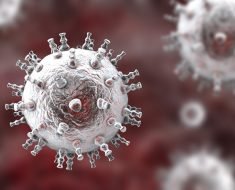![Brain-wide changes in activity during sickness behavior. a, Time line for sample collection and subsequent whole-mount brain imaging of FOS. Samples (circled numbers) were collected at the indicated time points post saline or LPS (0.5 mg kg<sup>−1</sup>) injection. n = 4 for each group except for 24 h post LPS, for which n = 3. b, Heatmap of log2[fold change] for LPS versus saline in the indicated regions at each time point. Only regions with at least one significant change at a time point (false discovery rate-adjusted P < 0.05) are shown. Left colour bar, brain subdivision; CTXsp, cortical subplate; STR, striatum; PAL, pallidum; MB, midbrain; AP and NTS are indicated. c,d, Representative images of FOS expression 3 h after saline (c) and LPS (d) injection. The right panels show a higher-magnification view of the NTS–AP region outlined in the left panels. Scale bars, 1 mm (left) or 250 μm (right). e, From left to right: the NTS and AP in the Allen Brain Atlas (ABA), ClearMap output of significant changes (false discovery rate-adjusted P < 0.05, red) for post LPS (3 h) versus saline injection, ClearMap-generated average heatmap of FOS counts for saline injection (n = 4), and ClearMap-generated average heatmap of FOS counts for LPS injection (3 h, n = 4). f,g, FOS counts for the NTS (f) and AP (g), for the indicated treatments (LPS concentration, 0.5 mg kg<sup>−1</sup>) and time points; output from ClearMap. Error bars represent s.e.m. The mouse illustration in a was created using BioRender.com. Credit: <i>Nature</i> (2022). DOI: 10.1038/s41586-022-05161-7 Neurons in the brainstem that regulate illness symptoms found in mouse model](https://scx1.b-cdn.net/csz/news/800a/2022/neurons-in-the-brainst.jpg)
A team of researchers at The Rockefeller University, working with a colleague from Fudan University, has found the neuron clusters in the mouse brain that regulate illness symptoms. In their paper published in the journal Nature, the group describes the multi-stage process they conducted to locate the nerve bundles and why finding them could be important. Amirah-Iman Hicks and Masha Prager-Khoutorsky with McGill University, have published a News & Views piece in the same journal issue outlining the work.
When people (or mice) become sick, they tend to exhibit symptoms such as fever, aches and nausea. Prior research has shown that the body produces such symptoms as a way to combat whatever is behind the illness. But how the brain carries out these activities is still unknown. In this new effort, the researchers studied mice exhibiting illness symptoms.
The researchers first injected them with lipopolysaccharide, a bacterial endotoxin, rather than infecting them directly—this allowed for more consistent symptoms. They then conducted brain scans on the mice multiple times over 24 hours to learn more about what was happening in the brain as it initiated illness symptoms. They found that shortly after the first injection, a subset of neurons in the brainstem called the nucleus of the tract (NTS) became active, as did the area postrema (AP). Prior research has shown that the NTS receives signals from the large intestine and the AP is constantly bathed in humoral factors.
The researchers then used a technique called TRAP2 to activate the neural group in test mice who did not receive injections of lipopolysaccharide. These mice exhibited the same illness symptoms as those mice who had received the injections. They also found that inhibiting the nerve groups in mice who did have the injection greatly reduced illness symptoms.
Next, the researchers conducted RNA sequencing on the cells in the nerve groups they had identified—that allowed them to identify the particular neurons within the clusters they had identified that were responsible for initiating illness symptoms.
Source: Read Full Article





